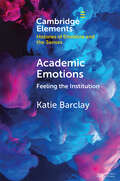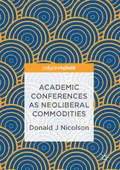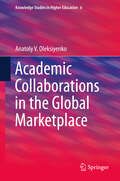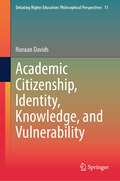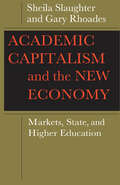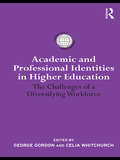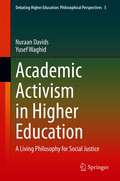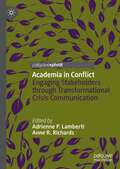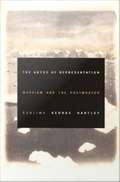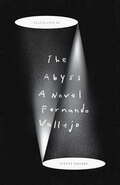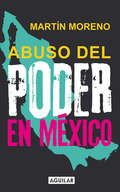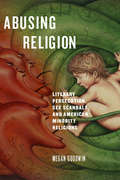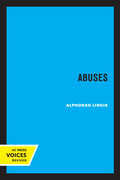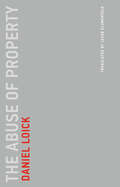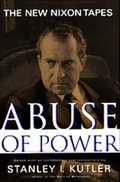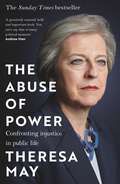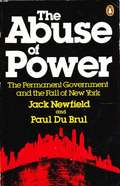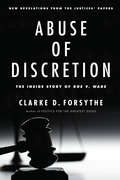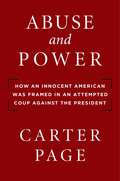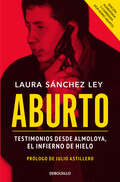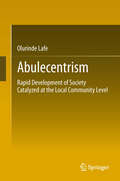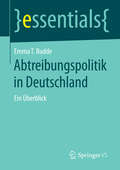- Table View
- List View
Academic Emotions: Feeling the Institution (Elements in Histories of Emotions and the Senses)
by Katie BarclayThe University is an institution that disciplines the academic self. As such it produces both a particular emotional culture and, at times, the emotional suffering of those who find such disciplinary practices discomforting. Drawing on a rich array of writing about the modern academy by contemporary academics, this Element explores the emotional dynamics of the academy as a disciplining institution, the production of the academic self, and the role of emotion in negotiating power in the ivory tower. Using methodologies from the History of Emotion, it seeks to further our understanding of the relationship between the institution, emotion and the self.
Academic Conferences as Neoliberal Commodities
by Donald J NicolsonThis book empirically examines academic conferences in the social sciences, and explores the purpose and value of people interested in the social sciences attending and presenting at national and international academic conferences. Using a highly original structure and style, the book considers the damaging impact of neoliberalism on conferences, and academia more widely, and explores the numerous barriers to conference attendance. It will be of interest to students and researchers who attend conferences in fields spanning the social sciences, as well as those interested in the effects of neoliberalism on academia.
Academic Collaborations in the Global Marketplace (Knowledge Studies in Higher Education #6)
by Anatoly V. OleksiyenkoThis book explains why conflict between the institutional and human agencies is an unavoidable outcome of competing local, national and global agendas at a major research university. It illustrates this by means of a case-study of Glonacal U, a university which belongs to the category of exceptional institutions that excel due to an established organizational culture of academic freedom, research excellence, shared governance, and intellectual leadership. The book shows how such a university may succumb to anxiety when neoliberal managers seek to exploit stakeholder doubts about university sufficiency, relevance, and performance in national and global markets and hierarchies of knowledge products and status goods. As top-down pressure for strategic choices in scientific partnerships increases at the world-class university, grassroots resistance to centralization increases also in order to remind the research university leaders that intellectual work and academic freedom are interdependent and central to building capacities for impactful global science. Productive global linkages are prerogative of academics who take full responsibility for success of project implementation and outcomes in scholarship and practice.
Academic Citizenship, Identity, Knowledge, and Vulnerability (Debating Higher Education: Philosophical Perspectives #11)
by Nuraan DavidsThis book brings into contestation the idea of academic citizenship as a homogenous and inclusive space. It delves into who academics are and how they come to embody their academic citizenship, if at all. Even when academics hold similar professional standings, their citizenship and implied notions of participation, inclusion, recognition, and belonging are largely pre-determined by their personal identity markers, rather than what they do professionally. As such, it is hard to ignore not only the contested and vulnerable terrain of academic citizenship, but the necessity of unpacking the agonistic space of the university which both sustains and benefits from these contestations and vulnerabilities.The book is influenced by a postcolonial vantage point, interested in unblocking and opening spaces, thoughts, and voices not only of reimagined embodiments and expressions of academic citizenship but of hitherto silenced and discounted forms of knowledge and being. It draws on academics' stories at various universities located in South Africa, USA, UK, Hong Kong, and the Philippines. It steps into the unexplored constructions of how knowledge is used in the deployment of valuing some forms of academic citizenship, while devaluing others. The book argues that different kinds of knowledge are necessary for both the building and questioning of theory: the more expansive our immersion into knowledge, the greater the capacities and opportunities for unlearning and relearning.
Academic Capitalism and the New Economy: Markets, State, and Higher Education
by Sheila Slaughter Gary RhoadesAs colleges and universities become more entrepreneurial in a post-industrial economy, they focus on knowledge less as a public good than as a commodity to be capitalized on in profit-oriented activities. In Academic Capitalism and the New Economy, higher education scholars Sheila Slaughter and Gary Rhoades detail the aggressive engagement of U.S. higher education institutions in the knowledge-based economy and analyze the efforts of colleges and universities to develop, market, and sell research products, educational services, and consumer goods in the private marketplace. Slaughter and Rhoades track changes in policy and practice, revealing new social networks and circuits of knowledge creation and dissemination, as well as new organizational structures and expanded managerial capacity to link higher education institutions and markets. They depict an ascendant academic capitalist knowledge/learning regime expressed in faculty work, departmental activity, and administrative behavior. Clarifying the regime's internal contradictions, they note the public subsidies embedded in new revenue streams and the shift in emphasis from serving student customers to leveraging resources from them.Defining the terms of academic capitalism in the new economy, this groundbreaking study offers essential insights into the trajectory of American higher education.
Academic and Professional Identities in Higher Education: The Challenges of a Diversifying Workforce (International Studies in Higher Education)
by Celia Whitchurch George GordonThe latest volume in the Routledge International Studies in Higher Education Series, Academic and Professional Identities in Higher Education: The Challenges of a Diversifying Workforce, reviews the implications of new forms of academic and professional identity, which have emerged largely as a result of a broadening disciplinary base and increasing permeability between higher education and external environments. The volume addresses the challenges faced by those responsible for the wellbeing of academic faculty and professional staff. International perspectives examine current practice against a background of rapidly changing policy contexts, focusing on the critical ‘people dimension’ of enhancing academic and professional activity, while also addressing national, socio-economic, and community agendas. Consideration is given to mainstream academic faculty and professional staff, researchers, library and information professionals, people with an interest in teaching and learning, and those involved in individual projects or institutional development. The following provide the key themes of Academic and Professional Identities in Higher Education: The Challenges of a Diversifying Workforce: The implications of diversifying academic and professional identities for the functioning of higher education institutions and sectors. The pace and nature of such change in different institutional systems and environments. The challenges to institutional systems and structures from emergent identities and possible tensions, and how these might be addressed. The implications of blurring academic and professional identities, with a shift towards mixed or ‘blended’ roles, for individual careers and institutional development.
Academic Activism in Higher Education: A Living Philosophy for Social Justice (Debating Higher Education: Philosophical Perspectives #5)
by Nuraan Davids Yusef WaghidThis book argues for renewed understandings of academic activism, understandings that conceive of the ideas, arguments and scholarship of the academe as embedded within the practices of what the academy does. It examines why and how a renewed notion of academic activism informs a philosophy of higher education specifically in relation to teaching and learning. The book focuses on the theories and practices of teaching and learning, in particular how such pedagogical actions are guided by social, political and cultural influences outside of the university as a higher education institution. The authors advocate for a living philosophy of higher education that is commensurate with real actions and imaginary fictions of what constitutes higher education and what remains in becoming for the discourse. With a focus on South African social justice education, the book imagines pathways for academic activism to manifest in revolutionised pedagogical actions or actions that bring into contestation what already exists with the possibility for the cultivation of renewal.
Academia in Conflict: Engaging Stakeholders through Transformational Crisis Communication
by Adrienne P. Lamberti Anne R. RichardsThis book explores communication as a key influence on the trajectory of conflicts and crises in the specific context of academia. From the ideological responsibilities of academia to the profit-seeking motives of institutions, the authors explore challenges facing faculty across multiple disciplines. Critique of the higher education industry is more necessary than ever in the context of academic corporatization and marketization. Academia in Conflict reveals how institutional discourses can contribute to or mitigate conflict and crisis, offering communication practices that prioritize stakeholder experiences and needs. Enduring academic crises are addressed, including declines in public funding, mental health emergencies, and threats to job stability. Academia in Conflict provides crucial insights for navigating the challenges of higher education today.
The Abyss of Representation: Marxism and the Postmodern Sublime
by George HartleyFrom the Copernican revolution of Immanuel Kant to the cognitive mapping of Fredric Jameson to the postcolonial politics of Gayatri Chakravorty Spivak, representation has been posed as both indispensable and impossible. In his pathbreaking work, The Abyss of Representation, George Hartley traces the development of this impossible necessity from its German Idealist roots through Marxist theories of postmodernism, arguing that in this period of skepticism and globalization we are still grappling with issues brought forth during the age of romanticism and revolution. Hartley shows how the modern problem of representation--the inability of a figure to do justice to its object--still haunts today's postmodern philosophy and politics. He reveals the ways the sublime abyss that opened up in Idealist epistemology and aesthetics resurfaces in recent theories of ideology and subjectivity. Hartley describes how modern theory from Kant through Lacan attempts to come to terms with the sublime limits of representation and how ideas developed with the Marxist tradition--such as Marx's theory of value, Althusser's theory of structural causality, or Zizek's theory of ideological enjoyment--can be seen as variants of the sublime object. Representation, he argues, is ultimately a political problem. Whether that problem be a Marxist representation of global capitalism, a deconstructive representation of subaltern women, or a Chicano self-representation opposing Anglo-American images of Mexican Americans, it is only through this grappling with the negative, Hartley explains, that a Marxist theory of postmodernism can begin to address the challenges of global capitalism and resurgent imperialism.
The Abyss: A Novel
by Fernando VallejoFinally, the Colombian Fernando Vallejo’s masterpiece, The Abyss, is available in English in a stunning translation by Yvette Siegert Winner of the Rómulo Gallego Prize, The Abyss is a caustic masterwork of incredible power and force, an unforgettable autobiographical work of queer fiction. The novel tells about the demise of a crumbling house in Medellín, Colombia. Fernando, a writer, visits his brother Darío, who is dying of AIDS. Recounting their wild philandering and trying to come to terms with his beloved brother’s inevitable death, Fernando rants against the political forces that cause so much suffering. Vallejo is the heir to Céline, Thomas Paine, and Machado de Assis. He hurls vitriolic, savagely funny insults at his country (“I wipe my ass with the new Constitution of Colombia”) and at his mother (“the Crazy Bitch”) who has given birth to him and his many siblings. Within this firestorm of pain, Fernando manages to get across much beauty and truth: that all love is painful and washed in pure sorrow. He loves his sick brother and the family’s Santa Anita farm (the lost paradise of his childhood where azaleas bloomed); and he even loves his country, now torn to shreds. Always, in this savage masterpiece about loss—as if in the eye of Vallejo’s hurricane of talent—we are in the curiously comforting workings of memory and of the writing process itself, as, recollecting time, it offers immortality.
Abuso del poder en México
by Martín MorenoAbuso del poder en México es una denuncia frontal a los actos vergonzantes de políticos y legisladores, líderes sindicales y empresarios televisivos, cómplices indolentes del deterioro de nuestro país en materia política, social y económica. Del autor de Demonios del sindicalismo en México, Martín Moreno. Abuso del poder en México aspira a despertar el ánimo de los ciudadanos para decir basta ante el delito, la injusticia y la desigualdad. ¿Cómo gobierna el presidente Calderón? ¿Por qué estalló la guerra entre los cárteles de la droga? ¿Cómo operan los priistas? ¿Por qué el DF está enfermo? ¿Qué hay detrás del conflicto entre el Gobierno y el Sindicato Mexicano de Electricistas? ¿Por qué nadie se atreve a enfrentar a Elba Esther Gordillo, al frente del Sindicato Nacional de Trabajadores de la Educación? ¿Cuál fue la ruta del dinero sustraído por Napoleón Gómez Urrutia, hoy impune en el extranjero? ¿Quién ordena la fabricación de culpables durante las investigaciones en los delitos de secuestro o intento de homicidio? Abuso del poder en México está sustentado por la investigación profunda y severa de Martín Moreno, quien retrata los sucesos más oscuros que marcaron el sexenio de Felipe Calderón, la ineptitud e indiferencia de funcionarios ante la tragedia de miles de mexicanos y la voracidad de políticos, narcos e inversionistas cuestionables que dictan sus propias leyes y marcan su territorio con violencia y sangre. El compromiso de Martín Moreno con la verdad, con la sociedad y con su país, lo llevan a denunciar los actos más deplorables de quienes ejercen el poder en México, sus prácticas de abuso, intolerancia, imparcialidad y soberbia.
Abusing Religion: Literary Persecution, Sex Scandals, and American Minority Religions
by Megan GoodwinSex abuse happens in all communities, but American minority religions often face disproportionate allegations of sexual abuse. Why, in a country that consistently fails to acknowledge—much less address—the sexual abuse of women and children, do American religious outsiders so often face allegations of sexual misconduct? Why does the American public presume to know “what’s really going on” in minority religious communities? Why are sex abuse allegations such an effective way to discredit people on America’s religious margins? What makes Americans so willing, so eager to identify religion as the cause of sex abuse? Abusing Religion argues that sex abuse in minority religious communities is an American problem, not (merely) a religious one.
Abuses
by Alphonso LingisPart travelogue, part meditation, Abuses is a bold exploration of central themes in Continental philosophy by one of the most passionate and original thinkers in that tradition writing today. A gripping record of desires, obsessions, bodies, and spaces experienced in distant lands, Alphonso Lingis's book offers no less than a new approach to philosophy—aesthetic and sympathetic—which departs from the phenomenology of Levinas and Merleau-Ponty. "These were letters written to friends," Lingis writes, "from places I found myself for months at a time, about encounters that moved me and troubled me. . . . These writings also became no longer my letters. I found myself only trying to speak for others, others greeted only with passionate kisses of parting." Ranging from the elevated Inca citadel of Machu Picchu, to the living rooms of the Mexican elite, to the streets of Manila, Lingis recounts incidents of state-sponsored violence and the progressive incorporation of third-world peoples into the circuits of exchange of international capitalism. Recalling the work of such writers as Graham Greene, Kathy Acker, and Georges Bataille, Abuses contains impassioned accounts of silence, eros and identity, torture and war, the sublime, lust and joy, and human rituals surrounding carnival and death that occurred during his journeys to India, Bangladesh, Thailand, Bali, the Philippines, Antarctica, and Latin America. A deeply unsettling book by a philosopher of unusual imagination, Abuses will appeal to readers who, like its author, "may want the enigmas and want the discomfiture within oneself." This title is part of UC Press's Voices Revived program, which commemorates University of California Press's mission to seek out and cultivate the brightest minds and give them voice, reach, and impact. Drawing on a backlist dating to 1893, Voices Revived makes high-quality, peer-reviewed scholarship accessible once again using print-on-demand technology. This title was originally published in 1994.
The Abuse of Property (Untimely Meditations #19)
by Daniel LoickA fundamental critique of the current property regime, calling for radical social and political change.In The Abuse of Property, Daniel Loick offers a multifaceted philosophical critique of the concept of property, broadly understood. He argues that property should not be the dominant framework in which human beings regulate the use of things, that property is not the same as use. Property rights, in his view, are not conditions of freedom or justice, but deficient, dysfunctional, and harmful ways of interacting with other people and the natural environment. He dissects not only the classic justifications of property (from John Locke's justification of property as a natural right based on individual freedom to Hegel's justification of property as a form of mutual recognition) but also the classic critiques of property, from Proudhon and Marx up to Adorno and Agamben.Through an innovative critical approach to legal studies, Loick demonstrates how the concept of property, historically applied to things and people and still a linchpin of our distorted relation with the world, forms a direct line from the Occupy movement to Black Lives Matter and beyond.
Abuse Of Power
by Stanley KutlerRichard Nixon said he wanted his administration to be "the best chronicled in history." But when Alexander Butterfield disclosed the existence of a voice-activated taping system to a Senate committee in July 1973, Nixon's White House and its recordings quickly became the most infamous in American history. The tapes dominated the final two years of Nixon's presidency, and almost single-handedly forced his resignation. But only 60 hours were actually made public in the 1970s. Many thousands of hours remained secret and in Nixon's hands, and he fought fiercely to keep them that way right up to his death. Finally, thanks to a lawsuit brought by historian Stanley I. Kutler with the advocacy group Public Citizen, a landmark 1996 settlement with the Nixon estate and the National Archives is bringing over 3,000 hours of tapes to light. The initial release in November 1996 of over 200 hours of material comprised all those conversations concerning abuse of power -- every Watergate-related tape, as well as those concerning many other campaign misdeeds and some Pentagon Papers discussions. Finally, the full story of Nixon's downfall can be told. From Ehrlichman's saying, "Dean's been admonished not to contrive a story that's liable not to succeed" to Nixon's asking, "Is the line pretty well set now on, when asked about Watergate, as to what everybody says and does, to stonewall?" Abuse of Power reveals a much more extensive cover-up than ever realized. From Colson's announcing, "Well, we did a little dirty trick this morning" to Nixon's ordering a McGovern watch "around the clock" to the planting of a spy in Ted Kennedy's Secret Service detail, Abuse of Power redefines the meaning of campaign tactics. And from a worried discussion of Dwayne Andreas's "bag man" to Nixon's stating that the burglars "have to be paid. That's all there is to that," to a quiet conversation with Rose Mary Woods to see if there remained $100,000 in his safe for "a campaign thing that we're talking about," here is a money trail that anyone can follow. Packed with revelations on almost every page, the Abuse of Power tapes offer a spellbinding portrait of raw power and a Shakespearean depiction of a king and his court. Never have the personalities of Haldeman, Ehrlichman, Colson, Haig, Kissinger, Dean, and Mitchell been so vividly captured with the spoken word. And never has an American President offered such a revealing record of his darkest self.
The Abuse of Power: Confronting Injustice in Public Life
by Theresa MayFormer Prime Minister Theresa May exposes the abuse of power by public institutions and politicians in a series of riveting first-hand accounts from her time in office.As Prime Minister for three years and Home Secretary for six years, Theresa May confronted a series of issues in which the abuse of power led to devastating results for individuals and significantly damaged the reputation of, and trust in, public institutions and politicians. From the Hillsborough and Grenfell tragedies, to the Daniel Morgan case and parliamentary scandals, the powerful repeatedly chose to use their power not in the interests of the powerless but to serve themselves or to protect the organisation to which they belonged.The Abuse of Power is a searing exposé of injustice and an impassioned call to exercise power for the greater good. Drawing on examples from domestic and international affairs she was personally involved in at the highest level, including Stop and Search and the Salisbury Poisonings, the former prime minister argues for a radical rethink in how we approach our politics and public life.(P)2023 Headline Publishing Group Limited
The Abuse of Power: Confronting Injustice in Public Life
by Theresa MayAs Prime Minister for three years and Home Secretary for six years, Theresa May confronted a series of issues in which the abuse of power led to devastating results for individuals and significantly damaged the reputation of, and trust in, public institutions and politicians. From the Hillsborough and Grenfell tragedies, to the Daniel Morgan case and parliamentary scandals, the powerful repeatedly chose to use their power not in the interests of the powerless but to serve themselves or to protect the organisation to which they belonged.The Abuse of Power is a searing exposé of injustice and an impassioned call to exercise power for the greater good. Drawing on examples from domestic and international affairs she was personally involved in at the highest level, including Stop and Search and the Salisbury Poisonings, the former prime minister argues for a radical rethink in how we approach our politics and public life.
The Abuse of Power: Confronting Injustice in Public Life
by Theresa MayAs Prime Minister for three years and Home Secretary for six years, Theresa May confronted a series of issues in which the abuse of power led to devastating results for individuals and significantly damaged the reputation of, and trust in, public institutions and politicians. From the Hillsborough and Grenfell tragedies, to the Daniel Morgan case and parliamentary scandals, the powerful repeatedly chose to use their power not in the interests of the powerless but to serve themselves or to protect the organisation to which they belonged.The Abuse of Power is a searing exposé of injustice and an impassioned call to exercise power for the greater good. Drawing on examples from domestic and international affairs she was personally involved in at the highest level, including Stop and Search and the Salisbury Poisonings, the former prime minister argues for a radical rethink in how we approach our politics and public life.
The Abuse of Power
by Jack Newfield Paul A. DuBrul“This book was written as an act of gratitude and loyalty to New York City by two native sons. The only bias we admit to is a love for this city, and particularly for its neighborhoods. We were born here. We grew up in working-class families in neighborhoods called Bedford Stuyvesant and Elmhurst. The only reason we both have college educations is that the City University was free in 1956. We come from a tradition that believes in paying your debts. Our way of repaying New York City for our free college education is to try and tell the truth about what is happening now to our city. This book was born, four years ago, in our mutual recognition that something was profoundly wrong with New York and that the condition was worsening, despite decades of talk about "reform." The knowledge and the anger in these pages were nourished by day-to-day involvement with the city's small agonies. Welfare mothers with lead-poisoned children. Working-class Polish and Italian families losing their homes of a lifetime for someone else's profit. The unspeakable suffering, and the unspeakable corruption, in the nursing-home industry. A brave and difficult rent strike waged by 50,000 people in Co-op City. These are the people for whom we wrote this book, although many of them will perhaps never read it. We hope, though, that by describing the reality, by naming the names, and by proposing some remedies, we are offering a tool for others to use in liberating New York City in the future. This is the repayment of our debt.” – By Author.
Abuse of Discretion
by Clarke D. ForsytheBased on 20 years of research, including an examination of the papers of eight of the nine Justices who voted in Roe v. Wade and Doe v. Bolton, Abuse of Discretion is a critical review of the behind-the-scenes deliberations that went into the Supreme Court's abortion decisions and how the mistakes made by the Justices in 1971-1973 have led to the turmoil we see today in legislation, politics, and public health. The first half of the book looks at the mistakes made by the Justices, based on the case files, the oral arguments, and the Justices' papers. The second half of the book critically examines the unintended consequences of the abortion decisions in law, politics, and women's health.Why do the abortion decisions remain so controversial after almost 40 years, despite more than 50,000,000 abortions, numerous presidential elections, and a complete turnover in the Justices? Why did such a sweeping decision-with such important consequences for public health, producing such prolonged political turmoil-come from the Supreme Court in 1973? Answering those questions is the aim of this book. The controversy over the abortion decisions has hardly subsided, and the reasons why are to be found in the Justices' deliberations in 1971-1972 that resulted in the unprecedented decision they issued.Discuss Abuse of Discretion on Twitter using hashtag #AbuseOfDiscretion.
Abuse and Power: How an Innocent American Was Framed in an Attempted Coup Against the President
by Carter PageThe chickens are coming home to roost for the corrupt officials, mainstream media, and Democratic operatives who ruined the life of an innocent American in an attempt to subvert our democracy. Carter Page, the man at the center of one of the worst scandals in our country&’s history, reveals how our nation&’s top law enforcement officials abused their power and framed an innocent American citizen in their effort to take down Donald Trump. Page&’s gripping account, which shows that the rot goes deeper than anyone realized, names the men and women who tried to pull off a coup and didn't care who got hurt.
Aburto: Testimonios desde Almoloya, el infierno de hielo
by Laura Sánchez Ley"Déjenme decirles que me tengo que bañar, porque el olor a chivo expiatorio es muy fuerte." -Mario Aburto, carta desde Almoloya- Una sorprendente crónica periodística que cuenta la verdadera historia de Mario Aburto, el hombre acusado de haber asesinado a Luis Donaldo Colosio. "Huye, José, huye, José, ven, pacá, cuidao con la culebra..." La canción opaca los gritos desenfrenados de la multitud cuando se escuchan los disparos que marcan un antes y un después en la historia contemporánea de México. Mario Aburto es detenido en Tijuana, lo acusan de asesinar a Luis Donaldo Colosio mientras la incertidumbre se apodera del país. ¿Era el mismo hombre el que aprehendieron en Lomas Taurinas y el que presentaron en Almoloya? ¿Era Mario el asesino? Para sus familiares y amigos la interrogante es más profunda y aún les duele: ¿cuál esel verdadero Mario? ¿El que la PGR catalogó como un enfermo psiquiátrico o el hombre aniñado que conocieron antes? A contracorriente de los complots fantasiosos, este libro descubre a un Mario Aburto inédito, pero va mucho más allá, pues ofrece ángulos del caso Colosio que se han pasado por alto durante más de dos décadas. La historia se cuenta por medio de cartas y llamadas hechas desde la prisión, de expedientes judiciales y de entrevistas a personajes clave. Todavía hoy, varios han pedido anonimato por miedo a ser asesinados, como ocurrió con miembros del equipo de seguridad e investigadores. Al mismo tiempo, Aburto destaca por su retrato de la injusticia vista a través de los ojos de los habitantes de un barrio marginado donde quedó enterrado bajo un monumento el espejismo de un México que supuestamente iba a cambiar. Esta obra confirma que la desgarradura del 23 de marzo de 1994 no pierde vigencia, incluso para aquellos que defienden la versión del asesino solitario como incontestable, en la medida en que desenmascara la falsedad de un aparato estatal que persigue, tortura, asesina, y garantiza la impunidad de un "grupo de gentes corruptas que andan por ahí nada más chupando sangre como los vampiros", como le escribió alguna vez Mario Aburto a su padre.
Abulecentrism: Rapid Development of Society Catalyzed at the Local Community Level
by Olurinde LafeThe book describes a development concept called abulecentrism. The Yoruba word abule (pronounced: a-boo-lay) literarily means "the village". abulecentrism seeks to achieve rapid and sustainable development of a given society by the strategic execution of projects and the provision of critical services at the local community level. The village has always been the traditional unit of communal living in many societies around the world. The typical village is small, comprising close-knit social groups and individuals that number in the tens, or at most, low hundreds. In a village, people live close to one another, and derive strength in their communal methods of living, working and protecting their society. Furthermore, the management and governance of the community is simpler than in urban areas because the village requires smaller administrative systems. abulecentrism is built on the philosophy of using small, modular systems, such as a village, as building blocks for developing the greater society. The ultimate goal of abulecentrism is for the larger society to be significantly impacted by the dividends of the aggregated development attained within the different communities. Development projects will typically be executed by starting with a few local communities and progressing organically until all the communities that make up the larger society have been impacted.
Abu Nidal: A Gun for Hire
by Patrick SealeBritish journalist Seale, distinguished as a Middle East specialist, details the Arab terrorist's career, the sources of his vast personal fortune, the motives behind his acts of terrorism and his ties to various Middle East and European governments.
Abtreibungspolitik in Deutschland: Ein Überblick (essentials)
by Emma T. BuddeEmma T. Budde legt den Fokus auf die Darstellung und Erklärung der Regulierungsgeschichte von Abtreibungen in Deutschland von 1960 bis 2015. Sie kontrastiert die deutsche Entwicklung mit der Gesetzesentwicklung in Westeuropa. Hinsichtlich der Reformgeschwindigkeit und des Regulierungsniveaus ist Deutschland im internationalen Mittelfeld angesiedelt. Eine Besonderheit deutscher Abtreibungspolitik ist die Widersprüchlichkeit des aktuell geltenden Gesetzes, welches den Schwangerschaftsabbruch als gesetzeswidrig, aber gleichzeitig straffrei einstuft.
